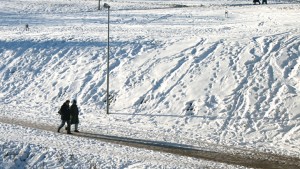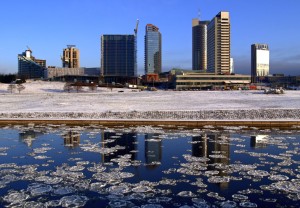
Vilnius, as in Riga and Tallinn, has been covered with several centimeters of snow for weeks. Photo by Nathan Greenhalgh
RIGA — Cold, cold and more cold. That’s what’s on the forecast for the Baltic states.
After last year’s relatively mild winter, each of the three countries are experiencing bone-chilling temperatures this year.
Latvia is coping with its coldest winter in 15 years, the country’ meteorological agency said, and the forecast for the weekend was for the thermometer to reach -30°C (-21°F) in parts of Latgale.
Andris Viksna, the director of the forecast department at the Latvian Environment, Geology and Meteorology Center, told the LETA agency Thursday that for the past 15 years the average winter temperature was above the norm of -5°C. This winter, however, the average will be lower. Worse, he said old man winter wasn’t going to let up any time soon.
“Winter will continue in the near future, and we shouldn’t wait for an early spring. In about ten days the cold will let up, and the temperature on the coast might exceed zero, 1°C,” he said. “But this doesn’t mean that warm weather will appear across Latvia, since in February the temperature will also be below zero.”
In Madona the temperature reached -21°C at 5 a.m. Friday morning. By contrast, the Kolka peninsula registered a “warm” -8°C, according to the meteorological center.
On Friday Latvia was bracing itself for a bitterly cold weekend, with temperatures expected to sink to as low as minus 30°C in eastern parts of the country. Some schools were warning about possibly closing for part or all next week.

The Neris River, winding through Vilnius, rarely freezes over in winter thanks to the sewage produced by city residents although chunks of ice do flow by.
Not just Latvia
In Riga the surface of the Daugava River is frozen over, but not the Neris River in Vilnius.
The reason isn’t the most appetizing — it’s because of sewage the Vilnius municipality pumps into the river, warming its temperature.
In Lithuania the cold isn’t setting records; this is the coldest winter since only 2006, as opposed to 15 years. But it will last longer than usual, as state meteorologists say people will be sliding on the sidewalk ice and shiver until the end of March as early spring won’t happen this year.
Estonia, the northernmost Baltic state typically gets the coldest winter of the three countries, and this time temperatures have dropped enough to freeze oil shale, disrupting the country’s power industry. This weekend it will be -21°C inland, but only -12°C.
While the temperatures are cold, the weather has been sunnier than usual, and all three Baltic capitals can look forward to a sunny, albeit frigid weekend.
— Baltic Reports editor Nathan Greenhalgh contributed to this article.












